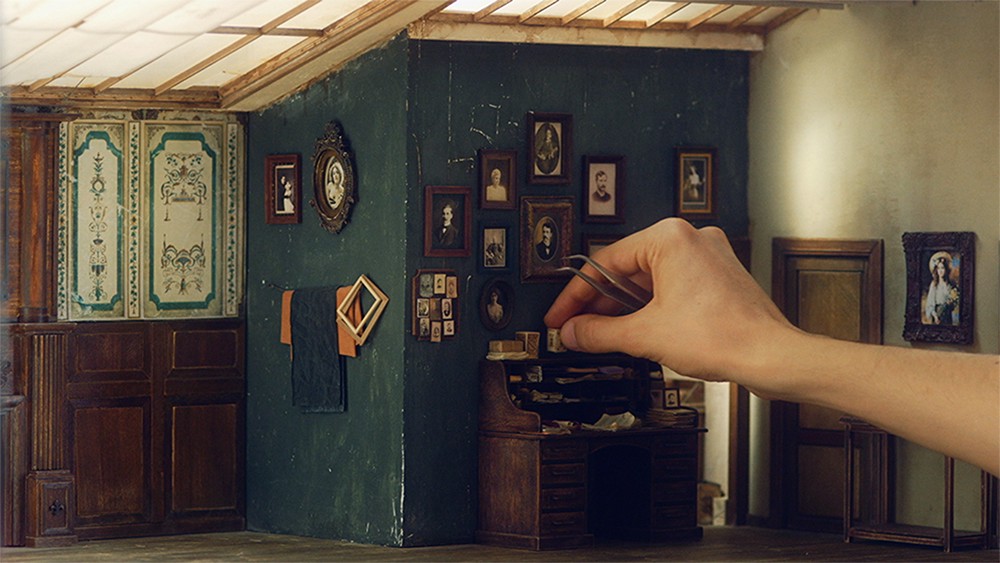Veena Rao’s work has been featured on The New York Times Op-Docs, The Atlantic, and National Geographic. A member of Brooklyn Filmmakers Collective, her previous credits include “Mumbai Mornings,” “So You Think You Can Vote?” and “Carla & Cecil.”
“Rebuilding in Miniature” will premiere at the 2018 Full Frame Documentary Film Festival on April 6.
W&H: Describe the film for us in your own words.
VR: “Rebuilding in Miniature” is a portrait of Ali Alamedy, a displaced Iraqi artist who creates intricately detailed dioramas of places he has imagined but has never been.
W&H: What drew you to this story?
VR: Growing up outside of Chicago, I used to love visiting the Thorne Miniature Rooms at the Art Institute of Chicago. I loved looking at each beautifully detailed room and imagining what it would be like to travel back in time and live in them. When I was looking for a new project last year, I thought of focusing on a miniature artist.
When I came across Ali’s work, I was blown away. When we started talking, I found his story to be deeply resonant. Ali loves the art of making miniatures, but creating them has also brought him a great deal of solace during chaotic times in his life.
W&H: What do you want people to think about when they are leaving the theater?
VR: I would love for viewers to reflect on the role of art in their lives. I believe Ali’s story represents the idea that the ability to dream and create is fundamental to who we are, and can get us through even the darkest times.
W&H: What was the biggest challenge in making the film?
VR: I think the biggest challenge was trying to figure out where to focus the story and still do justice to Ali’s personal story and art.
W&H: How did you get your film funded? Share some insights into how you got the film made.
VR: “Rebuilding in Miniature” premiered in The New York Times Op-Docs series, so I received a commission from them, as well as a grant from the New York State Council on the Arts.
The film was a small operation — I shot and directed it, and edited it as well, so I was able to make it with a tiny budget.
W&H: What does it mean for you to have your film play at Full Frame?
VR: I’m very excited to screen “Rebuilding in Miniature” at Full Frame. I’ve never been to the festival but have heard so many great things about it from fellow filmmakers.
This year’s lineup looks fantastic. I can’t wait to watch as many films as I can fit into four days!
W&H: What’s the best and worst advice you’ve received?
VR: The best advice I have ever received is that when thinking about a film you are making or want to make, you should ask yourself, “Does this make me feel?” If it doesn’t, you haven’t found the heart of your story.
Thankfully, I can’t think of any terrible advice!
W&H: What advice do you have for other female directors?
VR: The advice I’d give others is the same idea I like to repeat to myself — that to be an artist and a filmmaker means that you just keep making work, no matter what comes from it, where it takes you, or how challenging it can be sometimes. The only real qualification for being an artist is that you make things. Just never stop creating.
W&H: Name your favorite woman-directed film and why.
VR: That’s a hard question — there are so many! The first woman-directed film I fell in love with was Chantal Akerman’s “News From Home.” I love the mood and tone of it. Akerman captures New York City in the 1970s and a moment in her life so honestly that I found myself in the film, many years later, when I first moved to New York in 2002.
I also love everything Agnès Varda has done. She has a wonderful mix of playfulness, poetry, sense of wonder, and curiosity in all of her films.
W&H: Hollywood and the global film industry are in the midst of undergoing a major transformation. Many women — and some men — in the industry are speaking publicly about their experiences of being assaulted and harassed. What are your thoughts on the #TimesUp movement and the push for equality in the film business?
VR: This moment is long overdue and it’s amazing to see so many women and men speaking publicly about the abuses and inequality in the film business. I truly hope this is the beginning of a massive sea change in all areas and levels of our industry.







